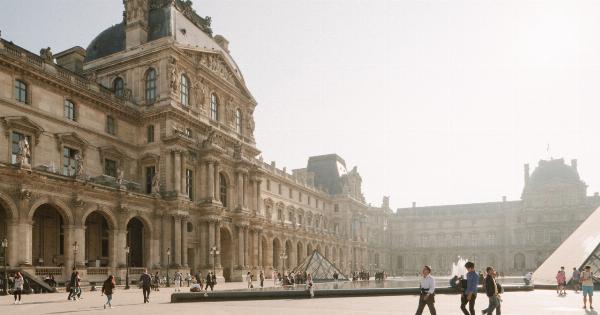Paris, the city of love and romance, is a dream destination for many travelers around the world. However, a peculiar phenomenon known as Paris Syndrome has been observed among Japanese visitors.
This syndrome has both psychological and physical symptoms that can greatly impact the experience of Japanese tourists in the French capital. In this article, we will delve into the causes, symptoms, and consequences of Paris Syndrome, shedding light on its impact on Japanese visitors.
Origins of Paris Syndrome
Paris Syndrome is a condition primarily experienced by Japanese tourists who develop a strong idealized perception of the city before their visit.
This extreme romanticization of Paris is fueled by various media forms, including movies, books, and advertisements. Japanese tourists often imagine Paris as a fairytale-like destination filled with elegance, art, and love.
However, the reality of the city can be vastly different from these idealized depictions, leading to a cognitive dissonance known as Paris Syndrome.
The Symptoms and Consequences
Paris Syndrome manifests through a range of psychological and physical symptoms.
The syndrome often begins with feelings of disappointment, frustration, and confusion when the actual experience in Paris fails to meet the overly romanticized expectations. Some of the psychological symptoms commonly observed among Japanese visitors include anxiety, depression, and even delusional thinking.
Physical symptoms of Paris Syndrome can include dizziness, fainting, sweating, and stomach pains.
These symptoms are often attributed to the stress and shock experienced by Japanese tourists who realize that their perception of Paris did not align with reality. The combination of physical and psychological symptoms can lead to severe distress and discomfort, significantly impacting the overall well-being and enjoyment of the trip.
Cultural Differences and Language Barriers
One of the key factors contributing to the development of Paris Syndrome among Japanese visitors is the stark cultural differences between Japan and France. The notion of politeness and hospitality in Japan greatly differs from that found in France.
Japanese tourists may feel uncomfortable or even offended by the directness and perceived rudeness of French locals, creating a culture shock that exacerbates the symptoms of Paris Syndrome.
Furthermore, language barriers play a significant role in amplifying the distress experienced by Japanese tourists.
Many Japanese visitors do not speak French fluently and struggle to communicate effectively, leading to feelings of isolation and frustration. The inability to navigate social situations and seek assistance intensifies the symptoms of Paris Syndrome, ultimately worsening the overall experience of the trip.
Addressing Paris Syndrome
Efforts have been made to address the issue of Paris Syndrome among Japanese tourists. The tourism industry in Paris has recognized the need for cultural sensitivity and has implemented measures to provide support and assistance to Japanese visitors.
Several initiatives, such as training programs for tourism professionals and the establishment of support helplines, aim to alleviate the distress experienced by Japanese tourists and promote a more positive experience in the city.
Additionally, Japanese travel agencies have taken steps to educate their clients on the potential realities of travel to Paris.
By providing more balanced and realistic portrayals of the city, these agencies hope to minimize the occurrence of Paris Syndrome and equip Japanese tourists with a better understanding of what to expect during their visit.
Moving Forward
As awareness of Paris Syndrome continues to grow, it is crucial to foster cultural understanding and empathy between different nations.
Japanese visitors can benefit from learning more about French culture and customs before their trip, helping them navigate potential cultural differences and reducing the likelihood of experiencing Paris Syndrome. Similarly, locals in Paris can also make efforts to be more accommodating and understanding towards Japanese tourists, recognizing the impact that cultural differences can have on their experiences.
In conclusion, Paris Syndrome is a fascinating phenomenon that highlights the power of perception and cultural differences.
Japanese visitors who suffer from Paris Syndrome experience a significant disconnect between their imagined idealized version of Paris and the reality they encounter. By acknowledging and understanding the causes and consequences of Paris Syndrome, both tourists and locals can work towards creating a more positive and fulfilling experience for all.






























